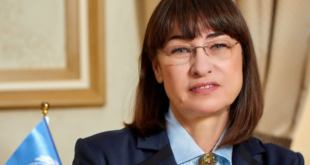Ati Metwaly mourns the passing away of Egypt’s beloved tenor
Ati Metwaly
“The greatest and most noble of all human beings,” wrote soprano Dalia Farouk on social media commenting on the death of Hassan Kami (also spelled Kamy), the former artistic director of the Cairo Opera Company, an actor and cultural activist as well as an opera singer.
The day of Kami’s passing (14 December 2018) left a void in the Egyptian artistic scene. Though he had gracefully reached the age of 82, his energy and enthusiasm had had everyone around him convinced that his presence in this world was an unalterable fact. Through the years he was always present and active, starting with opera and later in film and television; he was always either the dynamo or a main part of positive developments in culture, especially music.
A descendant of the Mohamed Ali dynasty, Kami was born on 2 November 1936 in Cairo. He attended the Jesuits School, studying law at Cairo University but also joining the Cairo Conservatory right after it opened in the 1950s.
Fluent in English, French and Arabic, starting in 1963 Kami began performing in numerous operas, with some of his first appearances being on the stage of the Khedivial Opera House, where he performed Radames in Verdi’s opera Aida. He was to perform this role hundreds of times in Egypt and internationally throughout his three-decade singing career. And while Kami took on many operatic roles — earning the third Global Award in operatic singing from Italy in 1969, then the fourth Global Award (1973), and an award from Japan (1976) as well as the first prize at the Olympic Music Festival in Seoul, South Korea (1988), and applauded by audiences around the world — opera Aida remained his beloved work. This dedication to Verdi and his Egypt-inspired opera led Kami to be the main motor of Aida’s biggest performance at the Pyramids in September 1987, the first time the opera was staged at this site.
This “greatest cultural event of the 20th century”, as Kami, the executive director of Opera Aida Productions called it, the 1987 Aidasaw the participation of 1,600 performers on a purpose-built 4,300 sq m stage. In an article published on those pages back in 2010, Kami commented that “the opera was performed on eight consecutive evenings, attracting 27,000 spectators. I managed to find the funds for this particular production, jeopardising [Bon Voyage Tourism Company, another company of his that he managed] and actually bankrupting it in the process. However, I scored a great point for culture and for Egypt. My dream had been realised.” He remembered in great detail this unique event, recalling the participation of many remarkable artists, such as Ghena Dimitrova, the Bulgarian soprano and Giuseppe Giacomini, the Italian dramatic tenor. The production was conducted by Carlo Franci and directed by Mauro Bolognini.
Another mega production of Aida managed by Kami took place in 1994 at the Hatshepsut Temple in Luxor. Three years later, in October 1997, a further performance was organised against the backdrop of the Deir Al-Bahari Temple, though the terrorist attack on tourists a month later put an end to opera performances in Luxor, and in 1998 the opera moved to the Pyramids, oscillating between the Cairo Opera House and the Giza plateau. Kami planned for another mega production in October 2001, which was expected to attract over 26,000, but it was cancelled as a mark of respect in the wake of the 9/11.
Kami’s work with the Aida productions was only one of many cultural commitments and activities he continued to pursue even after he stepped off stage. Only one and a half months prior to his passing, we could see Kami vigorously moving across the hall of the historical Manial Palace where in 1-9 November, he spearheaded the first classical music festival organised in Egypt, the “Manial Palace Festival: Reviving Heritage Through Music”. The festival dates’ marked the 149th anniversary of the opening of the Khedivial Opera House and the 143rd anniversary of the birth of Prince Mohamed Ali Tawfik (1875-1955).
Being also the chairman of the board of the Friends of Manial Palace Association (founded in 2006 by Prince Abbas Helmi, grandson of Abbas Helmi II, the last Khedive of Egypt), Kami paid attention to all the details of this unique event, including bringing over the crème-de-la-crème of expatriate Egyptian musicians and taking care of the audience. The musicians handpicked by Kami included the German-based Egyptian mezzo soprano Gala El-Hadidi, the Egyptian-Austrian violinist Nadine Weber, the renowned Paris-based pianist Ramzi Yassa and soprano Fatma Said among other Egyptian and international names. And though many of these musicians grace Egypt’s stages on different occasions, it was the first time to have them all come together to the same — and in fact the first — classical music festival in the country. With good reason, Kami looked proud as he presented the artists on stage and listened to them in an audience seat. If that was his last contribution to Egypt’s cultural scene, it is a remarkable one, which will be remembered and hopefully developed.
For even if he is no longer with us, Kami’s presence in the country remains very strong and goes far beyond the classical music sphere. Among his great passions were rare books and manuscripts, in addition to maps and photos which he owned in the thousands. Many of us are aware of the L’Orientalist bookshop, which holds all those treasures, in downtown Cairo. In fact, Kami bought the bookshop, developed it and gifted it fully to his beloved wife Nagwa, who played a large role in its management. After Nagwa’s death in 2012, Kami continued to look after the L’Orientalist’s treasure trove.
When Kami left this world in mid-December, many voiced their concern about the future of the old books and manuscripts there, but the Bibliotheca Alexandrina has revealed that it is having talks with Kami’s heirs with a view to taking over those treasures and creating an inventory that would be accessible to the public. It is yet to be agreed which books and manuscripts will be sold to the Bibliotheca and which donated.
Kami’s cultural dynamism made its mark on numerous film and television appearances, a career he enjoyed after stepping down from the operatic stage in the late 1990s. Though his first minor appearance was in the Gonoun Al-Hob (1977), a romantic drama directed by Nader Galal, his acting took a more significant turn in films such as Nasser 56 (1996), Zaki Chan (2005), Bobbos (2009) and the TV series Al-Gamaa (2010), among others.
Alongside other cultural activities, Kami was active in a variety of businesses, which he used to benefit Egypt’s artistic scene. In the late 1950s he worked in the Karnak Tourism Company, serving as a director of the Middle East Aviation Station at Cairo Airport from 1961 to 1968, and he was chairman of the Bon Voyage Tourism Company as of the late 1970s. As a result, he received a prestigious certificate of appreciation from the tourism and civil aviation authority in 1976.
Kami’s connection to tourism reflected his obvious love of travel. Active on social media for two years following Nagwa’s death, he continued to post one photo each day showing his beloved wife — and occasionally their only son Sherif, who had died a few years before Nagwa — in different corners of the world. Each photo carried a caption underlining Nagwa’s beautiful smile and angelic nature. Kami spoke very tenderly about Nagwa in many televised interviews, saying he stopped posting daily photos in response to some comments from the viewers. He nevertheless remained very active on social media, sharing moments of his life, be they meetings with the friends or Christmas preparations he was working on a few days before his death.
Kami’s cousin Sohaila Al-Sawy posted a remarkable comment following his passing on Facebook. In it, she recalled Kami telling her about a great piece of advice he received from one of Egypt’s greatest artists, Um Kolthoum:
“It was when he was a young man standing on stage facing his audience for the first time at the Opera. He was greatly applauded that night,” Al-Sawy writes. “Backstage there was a man waiting to see him. ‘Come with me, the Sitt wants to see you’, the man said to young Hassan. Walking through long corridors they arrived to one of the loges and inside, in the shadows, was Um Kolthoum, sitting. This is what she told Hassan Kami: ‘You are good looking and the audience loved you. But three things you must never forget: don’t let it go to your head, respect your audience; look after your health, you owe it to your audience; and play sports, play sports.’”
Following this advise and his nature, Kami remained highly respected by his audience and everyone he encountered. Those mourning his passing on social media refer to him as “a true prince and the noblest of men”. Indeed, he carried himself as such, until the last days of his life. In many ways, Kami’s activities in the cultural field, the dynamism and positive spirit he shared with everyone — despite the many personal pains that life brought upon his shoulders – made us take his presence for granted — no one could imagine that one day the life of this nobleman could end. Now that it has, sadly, we can only cherish him and his life’s work all the more.
From: Al-Ahram Weekly






